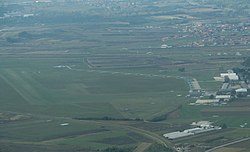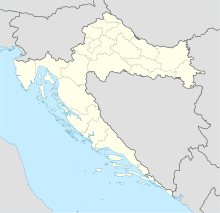Lučko Airfield (ICAO: LDZL, Croatian: Zračno pristanište Lučko) is an airfield for general aviation and unscheduled air transport,[1] located in Ježdovec near Lučko, in central Croatia, 11 kilometres (6.8 mi) southwest of Zagreb. It is operated by Aeroklub Zagreb and has two parallel grass runways measuring 850 by 30 metres (2,789 ft × 98 ft). Due to the lack of surfacing on the runways, it is only used from spring to autumn in dry periods. Aside from traffic, the airport is today a venue for air shows, such as Zagreb Air Show and Adria Air Race and an operation base for civilian pilot training.
Lučko Airfield Zračno pristanište Lučko | |||||||||||||||
|---|---|---|---|---|---|---|---|---|---|---|---|---|---|---|---|
 Lučko Airfield from the air | |||||||||||||||
| Summary | |||||||||||||||
| Airport type | Military/Public | ||||||||||||||
| Owner/Operator | Aeroklub Zagreb | ||||||||||||||
| Serves | Lučko | ||||||||||||||
| Location | Ježdovec, Croatia | ||||||||||||||
| Opened | 1 April 1947 | ||||||||||||||
| Passenger services ceased | 1972 | ||||||||||||||
| Built | 1943 | ||||||||||||||
| Occupants | Croatian Air Force Lučko ATU | ||||||||||||||
| Time zone | CET (UTC+1) | ||||||||||||||
| • Summer (DST) | CEST (UTC+2) | ||||||||||||||
| Elevation AMSL | 123 m / 405 ft | ||||||||||||||
| Coordinates | 45°46′0.41″N 15°50′55.31″E / 45.7667806°N 15.8486972°E | ||||||||||||||
| Website | aeroklub-zagreb | ||||||||||||||
| Map | |||||||||||||||
 | |||||||||||||||
| Runways | |||||||||||||||
| |||||||||||||||
Lučko was formerly Zagreb's main international airport, and later supported military aviation. It was constructed in 1943 and saw commercial operations from 1947 to 1959, after which commercial traffic was moved to the new Zagreb Airport with paved runways in Pleso. Lučko thereafter remained an airport for military and general aviation.[1] Today it is also used by Croatian special police's Lučko Anti-Terrorist Unit.
The airport is equipped to serve light aircraft, helicopters, gliders, ultralight aviation, UAVs and parachuting. It is connected to Zagreb and Lučko by a regular bus line.
History
editThe area was first used for air traffic in World War II by Luftwaffe in 1943. The next year the airfield was upgraded with a roughly 1,500 m (4,900 ft) grass runway, a small hangar, twelve mid-sized sheds for airplanes as well as workshops, and towards the end of the war saw use by the Independent State of Croatia Air Force.[2] After the end of World War II, the airport began serving domestic commercial flights on 1 April 1947,[3] soon adding international flights to the roster[3] and taking the place of Borongaj Airport, which was heavily bombed during the war, as Zagreb's international airport.[2][4][5] Its first year of commercial operation saw 1,430 flights, 11,000 passengers and thirty tonnes of cargo.[4] In 1959, its final year of commercial operations,[4] the airport served 167,000 passengers and 1,500 tonnes (1,700 short tons) of cargo.[3] After the opening of the new Zagreb Airport in Pleso in 1962,[3] Lučko Airport's importance waned, as its grass runways were never paved to accommodate newer, heavier Convair jets, which were displacing Douglas DC-3 airliners' market share by the late 1950s. The commercial traffic was moved to Pleso and Lučko was allocated completely to the Yugoslav People's Army and Aeroklub Zagreb,[6] the latter of which was the first to open a civilian pilot school at Lučko.[1] In 1978, the 14th World Parachuting Championships was held at Lučko.[7]
In the 1990s, during the Croatian War of Independence, the airport was bombed by the Yugoslav People's Army, but the raid had been expected and all the airplanes and equipment had been evacuated beforehand.[6] Two of the civilian airplanes were donated by their owners to the nascent Croatian air forces.[6] After its formation, the Croatian Air Force began to use Lučko as an Air Base. The 94th Air Force Base was stationed there until it was disbanded in 2000,[8] though the airport continues to be used by the Air Force. As of 2007, an Air Force helicopter squadron was stationed at Lučko.[9] The Lučko Anti-Terrorist Unit of Croatian special police is also based at Lučko Airport and stations its helicopters there.[10]
One notable accident happened during the era of the airport's commercial operation, on 21 September 1950, when a Douglas DC-3 on a domestic Jugoslavenski Aerotransport (JAT) flight crashed, killing 10 of the 11 people on board.[11]
Facilities
editThe aerodrome is located on Ježdovečka Road 17[12] on the outskirts of the village of Ježdovec.[13] It is 3 km (2 mi) west of the eponymous Lučko and 11 km (7 mi) southwest of Zagreb's inner city borders.[12] Airplanes up to 5,700 kg (12,600 lb) in maximum takeoff weight, gliders, ultralight aviation, and UAVs (drones) are allowed at Lučko Airport, in addition to parachuting, and police and military helicopters.[12] The field is only used during dry periods from spring to autumn as the runways are not paved.[1] Shuttle bus service is not provided [14] but Ježdovec is served by the ZET bus line 168.[15]
Its reference point (ARP) is located at 45°46′0.41″N 15°50′55.31″E / 45.7667806°N 15.8486972°E at an elevation of 123 metres (405 ft)[12] and a magnetic variation of 4.2 °E as of August 2019.[16] There are two parallel runways in west-southwest and east-southeast orientation. The southern runway (10R/28L) is used mainly for powered aircraft, while the northern (10L/28R) is exclusively for unpowered aircraft.[12] The airport also has two anemometres, three aprons, and a control tower responsible for monitoring air traffic over the surrounding area and most of Zagreb west of Dubrava.[14]
| Runway name | Length | Width | Surface |
|---|---|---|---|
| 10R/28L | 850 metres (2,789 ft) | 30 metres (98 ft) | Grassy |
| 10L/28R | 850 metres (2,789 ft) | 30 metres (98 ft) | Grassy |
Air shows and competitions
editLučko has been a venue for a number of air shows and competitions, such as the yearly Zagreb Air Show (Croatian: Zagrebački aeromiting),[17][18] and Zagreb Cup (a parachuting precision landing competition; Kup grada Zagreba),[19] as well as the 2nd Adria Air Race in 2012.[20] Aeroklub Zagreb has also several times held Meetings for Rudi (Susreti za Rudija),[21][22][23] an air show in remembrance of Croatian Air Force pilot Rudolf Perešin.[24] Fédération Aéronautique Internationale's 14th World Precision Flying Championship took place at Lučko on 7–14 July 2002, attracting 54 participants from seventeen countries.[25]
The 2nd Military World Games took place in Zagreb in 1999, and the parachuting competition was held at the Lučko Airport.[26]
-
Replica of Slavoljub Penkala's 1910 model, the first aircraft in Croatia
-
Croatian police helicopter at the 2010 Lučko Air Show
-
Air Force jet in Croatian checkerboard colours at the 2010 air show
-
Giles G-202 aerobatic airplane parked at Lučko Airport
-
Eleanor Roosevelt disembarking a plane at the Lučko Airport in 1953
References
edit- ^ a b c d Šeb 2012, p. 101.
- ^ a b Šeb 2012, p. 97.
- ^ a b c d "Povijest i razvoj kroz vrijeme" [History and development over time] (in Croatian). Zagreb Airport. Archived from the original on 8 April 2015. Retrieved 8 August 2019.
- ^ a b c Šeb 2012, p. 99.
- ^ Naletina, Dora; Petljak, Kristina; Sremac, Marta (20 December 2018). "Characteristics and the Overview of Air Traffic in the Republic of Croatia". Pomorstvo. 32 (2): 297–311. doi:10.31217/p.31.2.15. Retrieved 10 August 2019.
- ^ a b c Ilić, Goran (2011). "Povijest Aerokluba Zagreb: Svaki napredni Zagrepčanin trebao bi biti član Aerokluba Zagreb" [History of Aeroklub Zagreb: "Every forward-thinking Zagreber should be a member of Aeroklub Zagreb"]. Aeroklub Zagreb (in Croatian). Retrieved 12 August 2019.
- ^ Šeb 2012, p. 106.
- ^ "Ex Yu Airforces". yuairwar.com (in Croatian). 19 December 2008. Archived from the original on 19 December 2008. Retrieved 12 August 2019.
- ^ Franičević, Mile (20 December 2007). "Ratno zrakoplovstvo imat će samo dvije baze". Vjesnik (in Croatian). Zagreb. Archived from the original on 20 December 2007. Retrieved 12 August 2019.
- ^ Novak, Tomislav (4 December 2015). "SPECIJALNIH 130 PROTIV TERORISTA Nitko im ne zna imena, za pola sata mogu doći do najudaljenije točke i intervenirati, slušaju samo ministra" [SPECIAL 130 AGAINST THE TERRORISTS Nobody knows their names, in half an hour they can reach and intervene in the most remote areas, they answer only to the Minister]. Globus (in Croatian). Retrieved 11 August 2019.
- ^ Ranter, Harro. "ASN Aircraft accident Douglas C-47A-25-DK (DC-3) YU-ABC Zagreb/Lucko Airport". Aviation Safety Network. Retrieved 21 August 2019.
- ^ a b c d e "Aerodrom Lučko" [Lučko Airport]. Aeroklub Zagreb (in Croatian). Retrieved 13 August 2019.
- ^ Šeb 2012, p. 98.
- ^ a b "Operativne procedure Aerodroma Lučko (LDZL)" [Operating procedures of Lučko Airport (LDZL)] (PDF). Aeroklub Zagreb. 29 October 2011. Retrieved 13 August 2019.
- ^ "Autobusne linije terminala Prečko" [Bus lines at Prečko Terminal] (PDF) (in Croatian). Zagrebački električni tramvaj, City of Zagreb. November 2017. Archived from the original (PDF) on 12 October 2019. Retrieved 13 August 2019.
- ^ "Lučko Airport - LDZL". Airportguide.com. Retrieved 13 August 2019.
- ^ "Zagrebačko nebo ponovno ugošćuje aeromiting" [The skies of Zagreb again hosting the air show]. Večernji list (in Croatian). 23 August 2011. Retrieved 12 August 2019.
- ^ "Umjesto u subotu, Zagreb Air Show održat će se u nedjelju" [Instead of Saturday, Zagreb Air Show will be held on Sunday]. Večernji list (in Croatian). 27 August 2010. Retrieved 12 August 2019.
- ^ "ZAGREB KUP 2017" [Zagreb Cup 2017]. Aeroklub Zagreb (in Croatian). 5 May 2017. Retrieved 12 August 2019.
- ^ "Sve je spremno za Adria Air Race: Akrobatski piloti nad Jarunom spremaju spektakl, čeka ih teška utrka" [Everything is ready for Adria Air Race: Aerobatic pilots creating a spectacle over Jarun, they are in for a tough race]. Index.hr (in Croatian). 7 June 2012. Retrieved 12 August 2019.
- ^ "XII. Susreti za Rudija" [12th Meetings for Rudi]. Aeroklub Zagreb. 10 May 2009. Retrieved 12 August 2019.
- ^ "XIII. Susreti za Rudija" [13th Meetings for Rudi]. Aeroklub Zagreb. 9 May 2010. Retrieved 12 August 2019.
- ^ "XV. Susreti za Rudija" [15th Meetings for Rudi]. Aeroklub Zagreb. 6 May 2012. Retrieved 12 August 2019.
- ^ "Ministar najavio letačku manifestaciju "Susreti za Rudija": "Hrvatima je dao nadu, neizmjeran ponos i prkos"" [Minister announces air show Meetings for Rudi: "He gave Croats hope, immeasurable pride and defiance]. Dnevnik.hr (in Croatian). Zagreb. 12 May 2019. Retrieved 12 August 2019.
- ^ Šeb 2012, p. 108.
- ^ Bell, Daniel (2003). Encyclopedia of International Games. Jefferson, North Carolina, U.S.: McFarland and Company. ISBN 0786410264.
Sources
edit- Šeb, Zvonko, ed. (2012). Zagreb Airport – 50 years (in English and Croatian). Zagreb Airport. Archived from the original on 10 April 2014.
External links
edit- Media related to Lučko Airport at Wikimedia Commons
- Media related to Lučko Air Show at Wikimedia Commons
